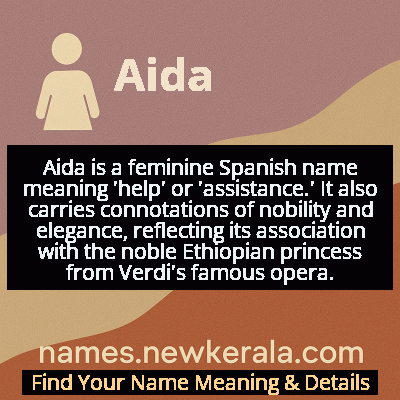Aida Name Meaning & Details
Origin, Popularity, Numerology Analysis & Name Meaning of Aida
Discover the origin, meaning, and cultural significance of the name AIDA. Delve into its historical roots and explore the lasting impact it has had on communities and traditions.
Name
Aida
Gender
Female
Origin
Spanish
Lucky Number
6
Meaning of the Name - Aida
Aida is a feminine Spanish name meaning 'help' or 'assistance.' It also carries connotations of nobility and elegance, reflecting its association with the noble Ethiopian princess from Verdi's famous opera.
Aida - Complete Numerology Analysis
Your Numerology Number
Based on Pythagorean Numerology System
Ruling Planet
Venus
Positive Nature
Harmonious, responsible, caring, and artistic.
Negative Traits
Overly idealistic, superficial, possessive, or jealous.
Lucky Colours
Pink, turquoise.
Lucky Days
Friday.
Lucky Stones
Diamond, turquoise.
Harmony Numbers
2, 3, 9.
Best Suited Professions
Artists, musicians, teachers, healthcare workers.
What People Like About You
Warmth, nurturing nature, artistic flair.
Famous People Named Aida
Aida Turturro
Actress
Known for her role as Janice Soprano in the HBO series 'The Sopranos'
Aida Cuevas
Singer
Mexican singer known as 'La Reina de la Canción Ranchera' and Grammy Award winner
Aida de Acosta
Aviator
First woman to fly a powered aircraft solo (1903), preceding the Wright Brothers' flight
Aida Overton Walker
Dancer and Choreographer
Pioneering African American performer known as 'The Queen of the Cakewalk'
Name Variations & International Equivalents
Click on blue names to explore their detailed meanings. Gray names with will be available soon.
Cultural & Historical Significance
The name's popularity in Spanish-speaking countries was further cemented by its similarity to existing Spanish names and its elegant, melodic quality that fits well with Romance language phonetics. Over time, Aida has evolved from its operatic roots to become a beloved name representing both cultural sophistication and emotional depth. The character's story of cross-cultural love and personal sacrifice resonates deeply in Hispanic cultures that value family loyalty and emotional authenticity, making Aida a name that embodies both dramatic romance and quiet strength.
Extended Personality Analysis
Women named Aida are often perceived as compassionate, nurturing individuals with a strong sense of responsibility toward others. They typically exhibit emotional intelligence and empathy, making them excellent listeners and reliable friends who naturally gravitate toward helping professions. Aidas tend to be artistic and creative, with an appreciation for beauty and culture that may manifest in various forms of self-expression. Their strength often lies in quiet resilience rather than overt dominance, allowing them to navigate challenges with grace and determination.
Many Aidas possess a diplomatic nature that enables them to mediate conflicts and bring people together, combined with an inner fortitude that helps them overcome personal and professional obstacles while maintaining their core values and integrity. They often demonstrate remarkable patience and the ability to see multiple perspectives, making them valuable in collaborative environments. While they may appear reserved initially, Aidas typically form deep, meaningful relationships and are fiercely loyal to those they care about. Their combination of emotional depth and practical wisdom makes them both inspiring leaders and trusted confidantes.
Modern Usage & Popularity
In contemporary usage, Aida maintains steady popularity in Spanish-speaking countries while being less common in English-speaking regions. The name experienced a resurgence in the early 2000s following the success of Elton John's musical adaptation, particularly among parents seeking culturally rich but accessible names. In Spain and Latin America, Aida remains a classic choice that bridges traditional and modern sensibilities, often appearing in the top 200 names for girls. The name's international appeal and easy pronunciation across multiple languages contribute to its enduring use among multicultural families. Recent trends show Aida being embraced by parents who appreciate its artistic associations and strong, yet feminine, qualities without being overly common or trendy. Its usage reflects a preference for names with cultural depth and historical resonance rather than fleeting fashionable choices.
Symbolic & Spiritual Meanings
Symbolically, Aida represents the intersection of duty and desire, embodying the tension between personal fulfillment and social responsibility. The name carries connotations of sacrificial love and noble suffering, reflecting the operatic character's ultimate choice between her heart and her people. Aida symbolizes the strength found in vulnerability and the power of quiet dignity in the face of adversity. Metaphorically, it represents bridges between cultures and the universal human experience of love transcending boundaries. The name also suggests hidden depths and complex emotional landscapes, much like the character who must navigate conflicting loyalties while maintaining her essential self. In broader symbolic terms, Aida embodies the idea that true strength often manifests through compassion and emotional intelligence rather than physical power or dominance, serving as a reminder that the most profound victories are often won through integrity and love rather than force.

